Belgian Aid Worker Subject To Torture, Ill-Treatment: Amnesty
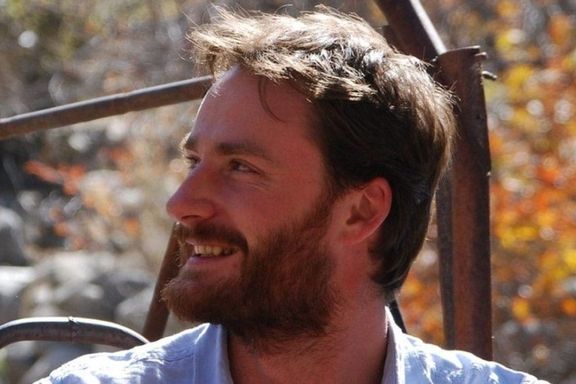
Amnesty International says Iranian authorities are subjecting Belgian aid worker Olivier Vandecasteele to enforced disappearance, torture and other ill-treatment.

Amnesty International says Iranian authorities are subjecting Belgian aid worker Olivier Vandecasteele to enforced disappearance, torture and other ill-treatment.
In a statement released on Monday, Amnesty International urged all states whose nationals are or have been detained at any point in Iran to promptly examine whether the deprivation of liberty amounts to an act of hostage-taking, and if so, take all appropriate measures to ensure accountability.
“He is held in solitary confinement in a windowless basement cell and is denied access to adequate healthcare and fresh air,” added Amnesty.
Additionally, his family and lawyer, as well as Belgian consular authorities, are unaware of his exact whereabouts.
Amnesty has warned that the Islamic Republic of Iran has kept this Belgian citizen as a "hostage" to exchange him with Asadollah Asadi, an Iranian diplomat.
Asadi has been sentenced to 20 years in prison for “attempted murder and involvement in terrorism” for his role in plotting to bomb a gathering of the MEK near Paris in 2018.
On 10 January 2023, Iranian state media announced that Vandecasteele was sentenced to 40 years in prison and 74 lashes, amidst indications that the Iranian authorities are holding him hostage to compel Belgian authorities to swap him for a former Iranian official imprisoned in Belgium.
Currently, at least 16 foreign citizens, most of whom dual nationals, are detained in the prisons of the Islamic Republic.
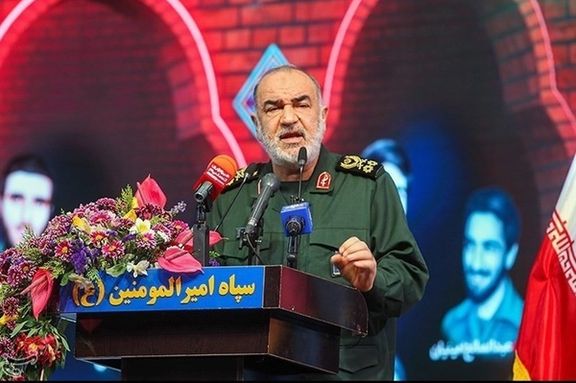
Commander of Iran’s Revolutionary Guard has threatened European countries that the Islamic Republic can target them by increasing the range of its weapons.
In remarks in the southern city of Abadan on Monday, the IRGC commander Hossein Salami said Europe is a pioneer in imposing sanctions against the Iranian people, and European countries have become a place for gatherings of “anti-Iranian separatists and fugitives”.
“We have the ability to increase the range of weapons and strike them seriously, but we have not yet done so,” he added.
“We warn them. The lives of Europeans depend on oil and security, and they should be careful and not endanger themselves.”
Elsewhere in his remarks, Salami stated that Westerners have done everything they could against Iran, but they must know that “we have found our way and our will is to create security, but the Europeans should be careful and not abuse our [kind] behavior.”
The threats by Salami come in a situation that EU officials are still hesitant to designate the IRGC as a terrorist group.
EU Foreign Policy Chief Josep Borrell has said the European Union cannot list Iran's IRGC as a terrorist entity until an EU court has determined that they are.
The European Parliament has called on the EU to list the Revolutionary Guards as a terrorist entity, blaming it for the repression of domestic protests and the supply of drones to Russia.
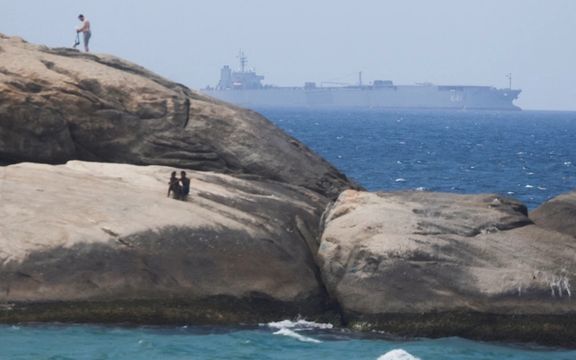
Two Iranian warships docked in Rio de Janeiro on Sunday the government granted permission despite pressure from the United States to bar them.
The IRIS Makran and IRIS Dena warships both arrived on Sunday morning, Rio's port authority said in a statement.
Reuters earlier this month reported that Brazil had bowed to US pressure and declined Iran's request for the vessels to dock in Rio in late January, in a gesture from Brazilian President Luiz Inacio Lula da Silva as he flew to Washington to meet US President Joe Biden.
However, with Lula's trip over, the ships have been allowed to dock. Vice Admiral Carlos Eduardo Horta Arentz, the deputy chief of Brazil's Naval Staff, gave his approval for the ships to dock in Rio between February 26 and March 4.
The presence of the Iranian warships on Brazilian shores continues to irk the United States as it seeks to build closer ties with Lula's administration, which came into office on January 1.
In a February 15 press conference, US Ambassador Elizabeth Bagley urged Brazil not to allow the ships to dock.
"In the past, those ships facilitated illegal trade and terrorist activities, and have also been sanctioned by the United States. Brazil is a sovereign nation, but we firmly believe those ships should not dock anywhere," she said.
Diplomacy with Iran was one of the highlights of Lula's attempts to bolster Brazil's international standing during his previous presidential terms. He traveled to Tehran to meet then-President Mahmoud Ahmadinejad in 2010 as he sought to broker a nuclear deal between Iran and the United States.
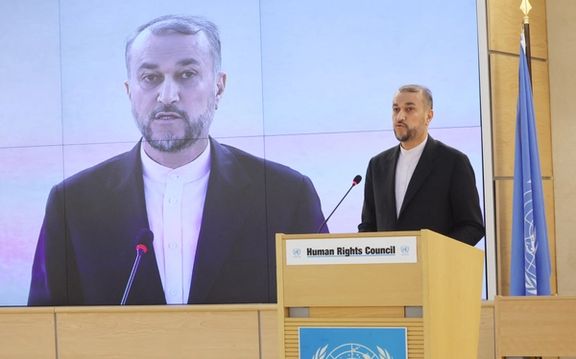
Tens of participants at the UN Human Rights Council walked out when the Islamic Republic’s foreign minister spoke at the 52nd session of the body on Monday.
Many seats were empty while Hossein-Amir Abdollahian was delivering his speech at UHRC’s headquarters in Geneva, following calls by activists urging delegates to walk out in reaction to the regime’s gross human rights violations, especially during the ongoing crackdown on antigovernment protests.
The current session of the council, made up of 47 member countries, will last for more than five weeks and is set to tackle an extensive array of human rights issues, including discrimination and freedom of religion, both major issues in Iran.
The council was one of the first international bodies to react to the current wave of protests, ignited by the death of Mahsa Amini in custody of hijab police. In November, the council voted to launch an independent investigation into the regime’s deadly repression, which has killed more than 500 civilians, including 70 children.
Most participants who left the hall in protest to Amir-Abdollahian's presence were members of NGOs as most diplomats preferred to stay and listen to the Islamic Republic’s rhetoric.
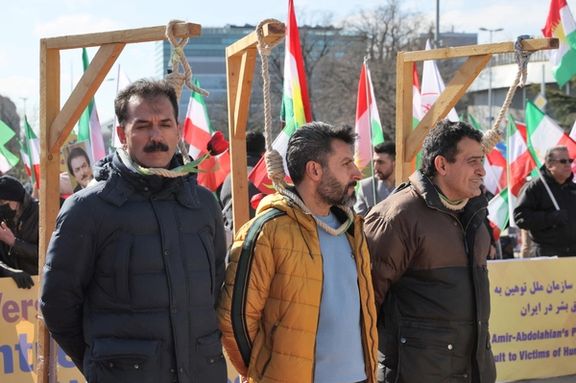
Trying to manipulate the realities on the ground, the Iranian FM said, “The peaceful assemblies that took place in my country following the sad death of Mahsa Amini... turned violent following the malign interference by some terrorist elements. In this respect, a number of Persian language TV channels based in the US and the UK, acted as provocateurs of hatred and propagators of violence.”
He also claimed that an investigation was ongoing and that all the people that were arrested during the protests have been released. He also claimed that "no one has been killed," in response to Iran International’s correspondent who asked him about the Islamic Republic's killing of protesters including a 10-year-old kid.
Outraged by Amir-Abdollahian's presence, many politicians and activists expressed concern about the UN’s move to invite the Iranian official for the opening day of the five-week session. Member of the Swedish parliament, Alireza Akhondi, said, “It’s a shameful day for the UN that they allowed representatives for a murderous regime to speak here about human rights.”
“I’m expecting that they (the UN) are redrawing their badges and they are not allowing them to enter this building anymore. Because they are not respecting the human rights of anybody and they are trying to harass and make the Iranian voices to not be able to be heard,” he added.
The foreign minister’s presence was not the only issue of contention among Iranian and foreign activists as he also held several meetings on the sidelines of the UN session, such as a meeting with the UN Secretary-General António Guterres, Belgian Foreign Minister Hadja Lahbib and Finnish Foreign Minister Pekka Haavisto.
The meetings shocked social media users, especially because Lahbib cut their hair in the country’s parliament in solidarity with anti-government demonstrations. Her meeting was criticized by many activists and officials, including Belgian lawmaker Darya Safai, who pointed out that “The Belgian government goes along with hostage diplomacy.” Lahbib herself tweeted about the release of Olivier Vandecasteele, an aid worker and a former employee of the Norwegian Refugee Council sentenced to 40 years in prison in Iran. Some believe her meeting with Amir-Abdollahian was probably an attempt to plead for his release.
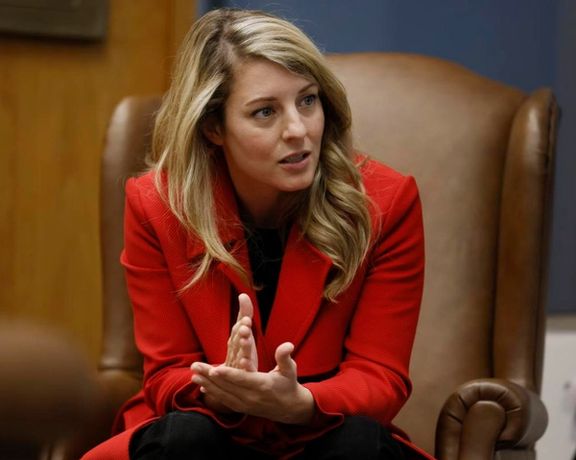
Canada says it has imposed sanctions on 12 senior officials from Iran's Islamic Revolutionary Guard Corps (IRGC) and Law Enforcement Forces for their role in "gross and systematic human rights violations."
In a statement Canada's foreign ministry announced on Monday that the targeted officials include Kurdistan Province Governor Esmaeil Zarei Kousha and Morteza Mir Aghaei, Commander of Basij paramilitary forces in Sanandaj, Kurdistan Province.
The measures prohibit dealings with the listed individuals, effectively freezing any assets they may hold in Canada.
They are also inadmissible to Canada under the Immigration and Refugee Protection Act, added the statement.
“Ottawa will continue to coordinate with its international partners to respond to the Iranian regime’s egregious treatment of its people, its deployment of propaganda and its actions that continue to threaten international peace and stability.”
Mélanie Joly, Minister of Foreign Affairs of Canada earlier stated that “The Iranian regime continues to brutally oppress its people and to deny them their fundamental rights and freedoms. We hear the pleas of the Iranian people, and we commend them for their bravery and resilience. Canada will not stop advocating for Iranians and their human rights.”
Iran’s suppression of nationwide protests since the death in custody of Mahsa Amini in September has drawn condemnation from international community with US and EU imposing sanctions on the regime.
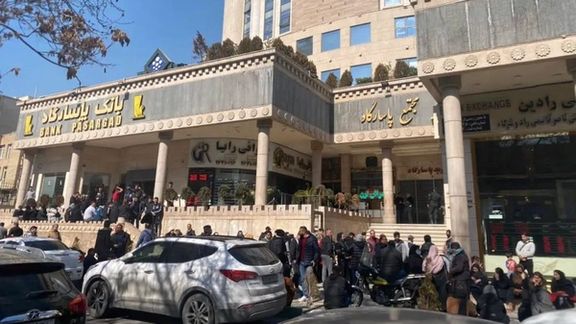
Trading in Tehran markets has largely come to a halt as the currency rial is near its all-time low, Iran International has learned from merchants and traders.
A textile trader told Iran International that “For now we have stopped selling our goods because we have no guarantee we can refill our stocks.” He added that "a lot of merchants have lost money because their payables are in dollars while they have to sell their goods in rials.”
Local media reported that the Central Bank of Iran intervened in the currency market by injecting $700 million in UAE dirhams on Sunday and the rial marginally rose from its all-time low of 600,000 against the US dollar. But such a sizeable intervention has not produced the desired result of stabilizing the rial.
First, the currency rose to 560,000 but after a few hours it dropped again, trading at more than 580,000 to the USD on Monday evening.
Parliament continued a third day of meetings about the currency crisis but there is little the legislature can do, except asking questions from President Ebrahim Raisi’s government. On Saturday, the president’s top economic aide, Mohammad Mokhber told lawmakers, “This is what it is,” rudely dismissing their criticism.
The fact that the reported monetary intervention was conducted using UAE dirhams instead of US dollars might indicate a shortage of greenbacks in the central bank.
The same grim news about a halt in trading came from the goldsmiths market in Tehran, where the fast-fluctuating currency rates have forced retailers to hold on to their gold and jewelry.
A currency dealer told Iran International that curbside trading has become highly risky as plainclothes security agents are everywhere in areas where usually people buy and sell foreign currencies.
Trading has also decreased in the food wholesalers’ market where one trader said goods such as sugar, oil and rice that can be stored have been shipped to warehouses, not to be sold until there is clarity with the value of the rial.
Pundits urged the government to tell the people what plans it has to tackle the crisis, but officials seemed bewildered and confused. The speaker of parliament Mohammad Bagher Ghalibaf (Qalibaf) was quick on Monday to claim that his fiefdom had predicted the currency crisis more than a month before and had warned the government. Others simply urged the government to “do something.”
Tehran’s Friday Prayer Imam, Kazem Sedighi, told the people to pray to fix the country’s problems. “We are in an economic war,” he said, just as the pioneers in Islam had to fight the unbelievers, this is also a holy war.
Foreign Minister Hossein Amir-Abdollahian was suddenly quoted as saying that during his visit to Iraq last week, he was told that the United States is open to resume nuclear negotiations. It was not clear why he had not disclosed the news three days earlier, except if suspicions that he tried to boost the rial was the real reason behind the belated revelation.
Some media outlets and commentators are speculating about changes in the government lineup, as many have been insisting for a long time that Raisi’s ministers are not up to the job.
One hardliner pundit, Mohammad Sadegh Koushki was quoted as saying that “If Mr. Raisi had the same information he has today prior to the presidential elections, he would have never become a candidate. Most presidential candidates [in Iran] have no idea about the magnitude of the job.”